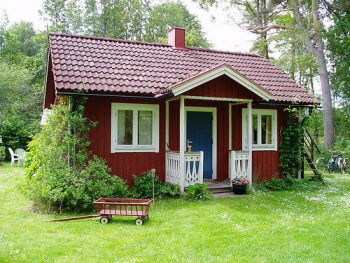Swedish Possessive Pronouns – Min, Mitt, Mina Posted by Marcus Cederström on Apr 12, 2016

In my last post, The Swedish Definite Form – Demonstrative Pronouns, I messed up. I wrote the following sentence: Detta röda hus är min. This red house is mine. See what I did wrong? Min. It should have been mitt. Detta röda hus är mitt. Why? Because hus is an ett-word. Ett hus. When…
Body parts in Swedish: The Head and Face Posted by Stephen Maconi on Apr 8, 2016

Maybe you have a doctor’s appointment. Maybe you have a headache. Maybe you just have a pretty face. Life is full of reasons to talk about your body, and when in Sweden, do as the Swedes do – speak Swedish! There are lots of body parts, so let’s start you off with vocabulary words describing…
The Swedish Definite Form – Demonstrative Pronouns Posted by Marcus Cederström on Mar 31, 2016

The Swedish language can be a bit tricky when working with the definite to describe something. As Stephen points out in “Why the double-definite in Swedish?” you’ll notice, if you haven’t already, that when you’re using an adjective to describe a noun in the definite form you’re going to double up on your definiteness. For…
“Must” and “have to” in Swedish Posted by Stephen Maconi on Mar 29, 2016
In English, we differentiate between “must” and “have to”. “Must” is generally considered more formal and authoritative, whereas “have to” may be interpreted more colloquial and less hard. Swedish, on the other hand, uses måste in all contexts. For Swedes, it’s just an ordinary, statusless modal verb. Måste used in the same way as…
In and out in Swedish – Part 2 Posted by Stephen Maconi on Mar 21, 2016
Välkomna tillbaka, mina damer och herrar! (And everyone else, of course!) In part 1 of In and out in Swedish, you learned how in and ut indicate movement while inne and ute indicate static location (i.e. non-movement). You also learned that in can be combined with a preposition to mean “into”. This is the same…
In and out in Swedish – Part 1 Posted by Stephen Maconi on Mar 18, 2016
Hej på er, Swedish learners! Swedish is, as many of you know, a Germanic language. As a result, a lot of central words to the language are very similar to English words. This is the case for in and ut, respectively meaning “in” and “out”. But in and ut in Swedish are a bit…
13 skills you need in Sweden Posted by Tibor on Mar 15, 2016
This article is so spot-on on the skills needed to live in Sweden, that I translated to English just for you guys. Enjoy! http://www.cafe.se/13-skills-du-behover-for-att-klara-dig-i-sverige/ 13 skills you need to live in Sweden In every country there are things that are specific to the place and the culture. And to survive in Sweden it is important to…


